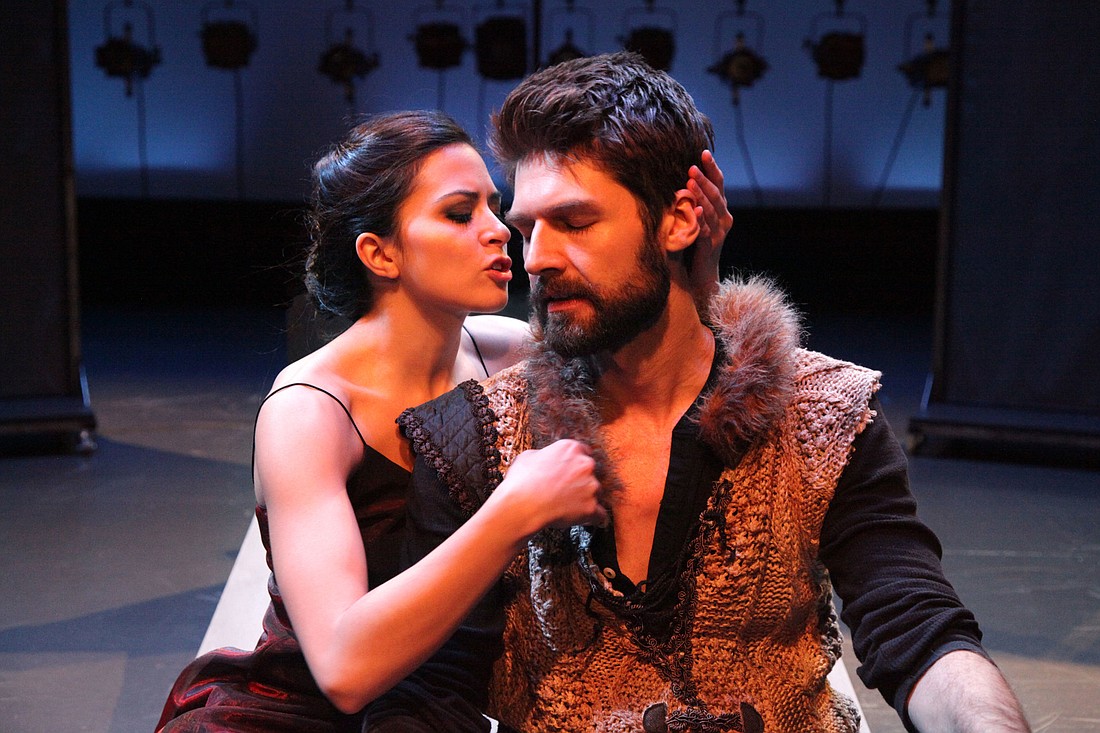- November 23, 2024
-
-
Loading

Loading

“Macbeth” is to theater what “Sympathy for the Devil” is to rock and roll. An aura of supernatural terror and bad luck shrouds this play. (Theater people actually avoid saying the name, substituting “The Scottish Play” instead.) That said, the gutsy folks at the Asolo Conservatory are staging it anyway. And a fearful show it is …
Shakespeare knew how to scare the hell out of people. You can analyze “Macbeth” to death. Ultimately, it’s a play about damnation.
As the play starts, Macbeth (Brett Mack) is a bloody hero and Lady Macbeth (Danielle Renella) is keening at the loss of their infant son. Three “wayward sisters” supernaturally appear on the battlefield and tempt Macbeth with a prophecy. They hail him as Thane of Cawdor — and the future King of Scotland. The notion worms into his brain: Why not speed the prophecy along by killing the current king of Scotland? Macbeth is no Hamlet. After a five minute discussion with his viciously ambitious wife, Macbeth makes up his mind to do it and does. After King Duncan’s (Michael Fisher) murder, it’s one bloody scene after another (implied gore, only). Macbeth sends hired thugs to slaughter his friend Banquo (Brandon Maldonado), because he heard the prophecy. (Banquo dies; his son escapes.) Macduff (Scott Kuiper) flees, planning to send for his wife and kids later. Bad plan; Macbeth brings an ultraviolent end to Macduff’s family. All this killing wipes out the Macbeths’ peace of mind. Macbeth sees floating daggers and Banquo’s ghost. Lady Macbeth wipes invisible blood from her hands and commits bloody suicide. But Macbeth is still cocky, because the Sisters prophesied that no “man of women born could kill him” and he’d be king until a certain forest moved. But the Sisters’ prophecies all have fine print. And Macbeth doesn’t get away scot-free.
Inversions of the natural order erupt like plague boils throughout the play. (“Nothing is but what is not” and “Fair is foul and foul is fair” being the most quoted). Director Jonathan Epstein plays with the notion of a topsy-turvy world and constantly keeps you off balance. The ground is constantly shifting beneath the characters’ feet —but you can always understand what they’re saying. The actors speak Shakespeare’s slightly trimmed words with contemporary American accents and speech rhythms.
The second-year conservatory students are close to the same age as their characters. They get into the skin of these poor souls, and make you feel the emotions boiling in their young blood. Mack’s Macbeth is hotheaded and impulsive but not immune to guilt. He has an inner life — and it’s an inner life of torture. Renella underplays the cliché of the crazy Lady Macbeth; her murderous mind was born in sorrow and bitterness. Kuiper is powerful as Macduff — and he’s especially heartbreaking when he hears about the slaughter of his family. Fisher is appropriately kingly in his brief scenes. Maldonado’s Banquo is a stand-up guy with rotten luck in friends. (And a lousy dinner guest.) Jacob Sherburne delivers some stand-up comedy as Seyton, explicating the bawdy meaning of his Elizabethan dialog with useful hand gestures. Jillian Courtney, Kelly Elizabeth Smith and Jessie Taylor are sexy and scary as the Wayward Sisters. (Aka, “The Three Witches,” though never so named.)
Chris McVicker’s set and lighting design is simply seven translucent panels on wheels. The actors shift them around, creating the impression of a world in flux. Some of the more extreme slashings and stabbings take place in silhouette inside the screens. (An array of spotlights backstage creates the occasional backlighting.) Silhouettes also reveal the future line of kings in Banquo’s family. Becki Leigh’s costumes are a cross between period accuracy and the future noir of “Blade Runner.” Robert Sestley and Dale Anthony Girard create excellent fight choreography. Sword and knife fighting is dirty fighting, and they know it. Eliza Ladd closes the play with a Scottish jig and nicely realizes the Wayward Sisters ecstatic/demonic rhythms. Speaking of which …
Are the Wayward Sisters even real? I’d have to say …
Hell yes.
Within the reality of this play, anyway.
Contemporary writers often reduce Macbeth’s supernatural elements to states of mind. That feels like a kind of prejudice—chronological chauvinism, if you will. When Lord and Lady Macbeth start to go to hell, the world does too. An owl kills a falcon. Duncan’s horses go insane and start eating each other …
Doesn’t sound like a state of mind, does it?
If you feel like a dose of terror, forget John Carpenter and Wes Craven and try Shakespeare instead. Just keep telling yourself it’s only theater. It can’t hurt you …
Can it?